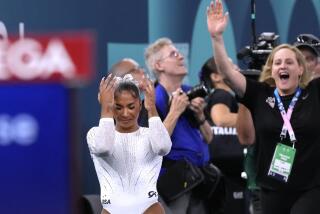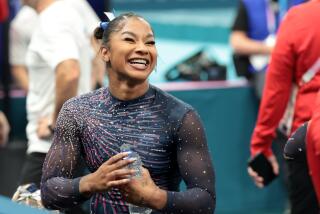OLD GLORY
- Share via
The first time Larry Robinson saw Chris Chelios, Robinson knew his brash, young Montreal teammate had a promising future.
“He was strong, and he was the type of guy who basically loved the game. If there was one thing he wanted in life, it was to play hockey,” Robinson said of Chelios, who joined the Canadiens after playing for the U.S. in the 1984 Olympics.
“He definitely had the talent. The only question is whether he would last. He played the game like there was no tomorrow.”
And lived that way too.
“We won’t talk about that,” Robinson said, laughing.
Marriage and fatherhood cured Chelios of his late-night habits; two fines and two suspensions from the NHL helped him tame his explosive temper. He’s probably smarter now than when he won the first of his three Norris Trophies as the NHL’s best defenseman, and he unquestionably is better able to control his emotions and avoid needless penalties.
“Maybe age is a factor, and maturity,” he said. “I don’t know if that’s good or bad because I’ve always based my game on playing emotionally.”
It’s good, because he has learned to play passionately, not recklessly.
Through 14 NHL seasons, one Stanley Cup championship and a trade that sent him from Montreal to his hometown Chicago Blackhawks in 1990, this son of Greek immigrants hasn’t lost the fire that illuminates his game. His selection for the Nagano Games, which will begin three weeks after his 36th birthday, solidified his status as perhaps the best American-born player ever to skate in the NHL.
To Blackhawk Coach Craig Hartsburg, a respected defenseman in his playing days, there’s no “perhaps” about Chelios’ supremacy.
“I don’t know anybody else who comes to mind,” said Hartsburg, whose team will face the Kings tonight at the United Center. “Joe Mullen? Pat LaFontaine? I don’t think any of them compares with Chris, with all due respect to them and what they’ve done in this league. He’s a great player and a superstar.
“Those guys are all good players, but put them all in their prime and which player would anybody rather have? I don’t think there’s any question.”
Lou Lamoriello, general manager of Team USA in last year’s World Cup and of the 1998 Olympic team, considered Chelios an automatic selection for both squads. He has followed Chelios’ career since Chelios and the Wisconsin Badgers defeated the Lamoriello-coached Providence Friars in the 1983 NCAA Final Four, and he is an unabashed Chelios fan.
“He comes to win and he’ll pay the price to win, whatever it is. That’s something you don’t teach. It has to be within a player,” Lamoriello said. “He has the knack of being able to lead without forcing it, of being a natural leader. He knows what to say, how to say it, when to say it.”
Chelios is embarrassed by such compliments, suggesting 1980 Olympian Neal Broten, Brett Hull, Mike Richter and Brian Leetch might be more worthy of being called the best hockey player America has produced.
“The big thing is that there’s a lot of American players you can choose from,” he said. “In 1984, there were only about 10 Americans in the league, or around that. We’re catching up. Maybe it’s that I’m the oldest American.
“I just feel fortunate to accomplish what I have, especially being an American and coming from Chicago. I’ll go as far as saying I’m the best American from Evergreen Park.”
That’s the Chicago suburb where he grew up. He played two years of high school hockey there before his parents, who ran a series of restaurants and bars, moved the family to San Diego. He was no child of privilege: he bussed tables and checked coats in his family’s restaurants, and while playing junior hockey in Moose Jaw, Canada, he worked in a lumberyard.
Hard work never scared him, and in Montreal he had fine teachers to guide him in Robinson, Jacques Laperriere and current King assistant coach Rick Green. His greatest advantages are his instincts and his ability to generate offensive production out of a strong defensive game. He scored 20 goals in 1987-88 and has twice scored 73 points--once despite spending 185 minutes in the penalty box and again despite 282 penalty minutes.
“That’s one of the things I like about him, that edge and that nastiness that keeps players he competes against on edge and brings his teammates to a new level,” Lamoriello said.
Chelios jokes that he’s “old for hockey but not for life,” but he still regularly plays 30 minutes a game, killing penalties and facing opponents’ top scorers. “He’s the kind of guy who plays by the seat of his pants, which could be bad if you have no concept of the game. But he does,” Robinson said. “He knows when to go and when to stay at home.
“He has a great feel for the game. Unfortunately a lot of great players lose that sense, that ability to read the game and play by feel. A lot of it is so regimented day to day, they lose that. This is a game of passion. He seems not to have forgotten that.”
Chelios still occasionally lets those emotions get the best of him, such as his foolish remarks during the lockout that Commissioner Gary Bettman should be concerned about his well-being and his family. More recently, however, he has been nearly angelic: after averaging 233 penalty minutes first four seasons in Chicago, he averaged 126 the last two seasons. He has one goal, 17 points and 37 penalty minutes in 35 games this season.
“The main thing is leaving the refs alone, which was a big problem,” said Chelios, who was suspended four games for resisting a linesman and four more for scratching at an opponent’s eyes in the 1993-94 season.
“The rules have changed too. If you elbow a guy, you don’t know if you’re going to get five minutes or what. You don’t want to get suspended. After I got suspended for eight games, I had to sit down and think about it. It’s a lot harder to intimidate people. You know you can’t go out and take peoples’ heads off. It’s a different role.”
He’s filling that role well, just as he’s filling the role of the Olympic team’s elder statesman. He and LaFontaine played on the 1984 squad, which finished seventh in the impossible position of following the gold medal-winning 1980 Lake Placid team.
“There was a lot of pressure on us because of [the 1980 success]. Everyone was watching, and that wasn’t all bad, because we were treated well, but we had a young team and it showed a little bit in the way we played,” Chelios said. “On paper, we looked like a good, highly skilled team, but if you don’t hit your peak at the right time, it’s not going to work. If we’d played three weeks earlier, when we were going good, it might have been different.
“It’s still a great honor to be picked. I think I won’t be as nervous because of all the experience I’ve had. Hopefully, it will be a better outing than the first one.”
The change in the Olympic format, to using NHL stars instead of college players, is one he grudgingly accepts. “The whole idea is exposure for hockey. Other sports have done it and it seems to have helped them,” he said. “If hockey is going to take that next step, hopefully this will do it. Obviously the U.S. team has got to be in the medal round for that to happen.
“It’s anybody’s tournament, but we’ve got a lot of confidence after the World Cup. That was great, but we know this is going to be a whole different ballgame. . . . When I look back at my career, I realize I’ve been fortunate. The best thing is I’m still going and we’ve got a chance to win an Olympic medal. And hopefully, we’ll bring the Stanley Cup to Chicago.”
Chelios, who has two years left on a contract extension he signed last season, probably has a better chance of winning a medal than getting his name on the Cup in Chicago. The Blackhawks’ 0-7 start this season was their worst ever, and they are near the bottom of the Western Conference.
“But who knows?” Chelios said. “Maybe we’ll get some players and turn things around.”
More to Read
Go beyond the scoreboard
Get the latest on L.A.'s teams in the daily Sports Report newsletter.
You may occasionally receive promotional content from the Los Angeles Times.







